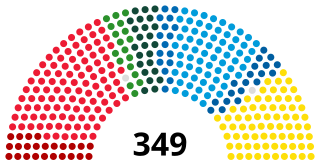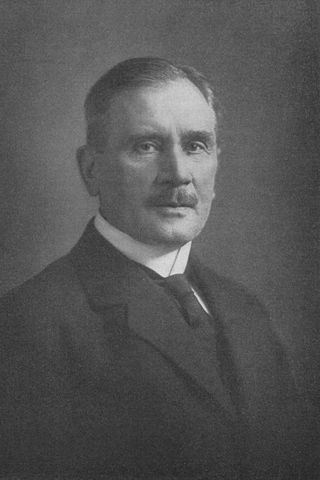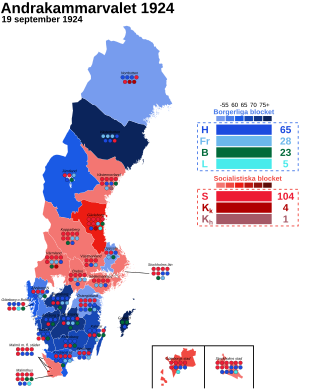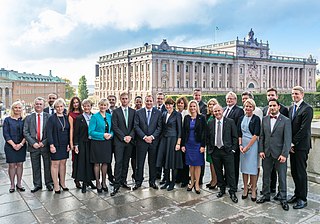
The politics of Sweden take place in a framework of a parliamentary representative democratic constitutional monarchy. Executive power is exercised by the government, led by the Prime Minister. Legislative power is vested in both the government and parliament, elected within a multi-party system. The judiciary is independent, appointed by the government and employed until retirement. Sweden is formally a monarchy with a monarch holding symbolic power.

The Riksdag is the legislature and the supreme decision-making body of the Kingdom of Sweden. Since 1971, the Riksdag has been a unicameral legislature with 349 members, elected proportionally and serving, since 1994, fixed four-year terms. The 2022 Swedish general election is the most recent general election.

Per Albin Hansson was a Swedish politician, chairman of the Social Democrats from 1925 and two-time Prime Minister in four governments between 1932 and 1946, governing all that period save for a short-lived crisis in the summer of 1936, which he ended by forming a coalition government with his main adversary, Axel Pehrsson-Bramstorp. He has been described as one of the fathers of modern Sweden.

Nils Edén was a Swedish historian and liberal politician who served as Prime Minister of Sweden from 1917 to 1920, and along with Hjalmar Branting acknowledged as co-architect of Sweden's transition from a constitutional monarchy to a fully parliamentary democracy with equal male and female suffrage.

Karl Hjalmar Branting was a Swedish politician who was the leader of the Swedish Social Democratic Party (SAP) from 1907 until his death in 1925, and three times Prime Minister of Sweden. When Branting came to power in 1920, he was the first Social Democratic Prime Minister of Sweden. When taking office for a second term after the general election of 1921, he became the first democratic socialist head of government in Western Europe elected under universal suffrage. An early supporter of modern social democracy and democratic socialism, he led the SAP through a transformation from a radical socialist movement to Sweden's dominant party; the Social Democrats have been Sweden's largest party in every election since 1914, and formed government for 44 continuous years from 1932 to 1976.

Baron Gerhard Louis De Geer of Finspång was a Swedish politician, who served in the first chamber of the Riksdag 1901–14, was governor of Kristianstad County 1905–23, and Prime Minister of Sweden for 121 days in 1920–1921. He was a son of Sweden's first Prime Minister, Louis Gerhard De Geer.

Ernst Trygger was a Swedish jurist, professor and conservative politician. He served as Prime Minister of Sweden from 1923 to 1924. He also served as Minister for Foreign Affairs from 1928 to 1930 in the government of Arvid Lindman. He was a member of the first chamber of the Swedish Riksdag from 1898 to 1937, and also leader of the conservatives in that chamber from 1913 to 1933.

Rickard Johannes Sandler was a Swedish Social Democratic politician. He served as minister without portfolio in the Swedish government from 10 March 1920 to 30 June 1920, minister for finance from 1 July 1920 to 27 October 1920, minister without portfolio from 13 October 1921 to 19 April 1923, minister of commerce and industry from 14 October 1924 to 24 January 1925, Prime Minister from 24 January 1925 to 7 June 1926, and as minister for foreign affairs from 24 September 1932 to 19 June 1936 and again from 28 September 1936 to 13 December 1939. Sandler is the only social democratic prime minister who did not also hold the post of party chairman. He is also the second-youngest prime minister of Sweden, aged 41 when he took office.

General elections were held in Sweden between 19 and 21 September 1924. The Swedish Social Democratic Party remained the largest party, winning 104 of the 230 seats in the Second Chamber of the Riksdag.

Early general elections were held in Sweden between 10 and 26 September 1921. It was the first elections held under universal suffrage, for both men and women. The Swedish Social Democratic Party remained the largest party, winning 93 of the 230 seats in the Andra kammaren of the Riksdag. Party leader Hjalmar Branting formed his second government.

General elections were held in Sweden between 4 and 17 September 1920, the last before universal suffrage was introduced the following year. The Social Democratic Party remained the largest party, winning 75 of the 230 seats in the Andra kammaren of the Riksdag. Later in October 1920 Hjalmar Branting was succeeded as prime minister by Baron Louis De Geer.

General elections were held in Sweden on 9 September 2018 to elect the 349 members of the Riksdag. Regional and municipal elections were also held on the same day. The incumbent minority government, consisting of the Social Democrats and the Greens and supported by the Left Party, won 144 seats, one seat more than the four-party Alliance coalition, with the Sweden Democrats winning the remaining 62 seats. The Social Democrats' vote share fell to 28.3 percent, its lowest level of support since 1911.

The second cabinet of Hjalmar Branting was the cabinet of Sweden between 13 October 1921 and 19 April 1923.

The third cabinet of Hjalmar Branting was the cabinet of Sweden between 14 October 1924 and 24 February 1925.

General elections were held in Sweden on 14 September 2014 to elect all 349 seats in the Riksdag, alongside elections for the 21 county councils, and 290 municipal assemblies.

Kjell Stefan Löfven is a Swedish politician who has served as the President of European Socialists since October 2022. He previously served as Prime Minister of Sweden from October 2014 to November 2021 and leader of the Social Democratic Party from 2012 to 2021.

The first cabinet of Stefan Löfven was the cabinet of Sweden between 2014 and 2018. It was a coalition government, consisting of two parties: the Social Democrats and the Green Party. The cabinet was installed on 3 October 2014, following the 2014 general election. It lost a vote of no confidence following the 2018 election, but remained in office as a caretaker government. Löfven was reelected as Prime Minister in January 2019, thus forming the second cabinet of Stefan Löfven.

The 2014 Swedish government crisis started on 3 December 2014 after the Riksdag rejected the proposed government budget in favour of a budget proposed by the centre-right opposition.
The first cabinet of Tage Erlander was the cabinet and government of Sweden between 11 October 1946 and 1 October 1951. It was formed following the sudden death of Prime Minister Per Albin Hansson on 6 October 1946.

















